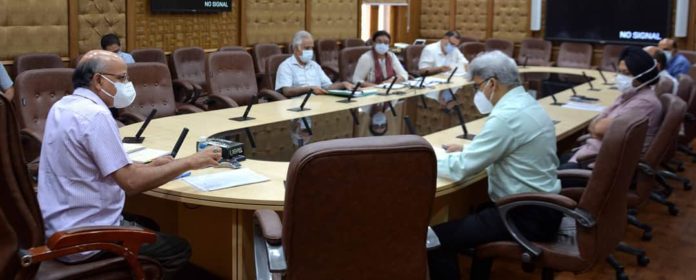Asymptomatic patients to be sent home with an oximeter
JAMMU, JULY 27: In a significant decision with regard to management of COVID-19 patients and in line with the earlier decision of reserving four tertiary hospitals in Srinagar as referral centres, the three tertiary hospitals in Jammu city shall now also be only referral hospitals for COVID-19 admissions. This was decided in a meeting chaired by the Chief Secretary, B. V. R. Subrahmanyam, to review COVID-19 mitigation measures in Jammu and Kashmir, here today.
Financial Commissioner, Health & Medical Education, Secretary, Disaster Management, Reconstruction, Relief and Rehabilitation, Director, National Health Mission, Principal, Government Medical College, Jammu, Director Health Services, Jammu, and other senior officers of Health and Administration participated in the meeting.
With an aim to maintain availability of beds in tertiary hospitals across Jammu and Kashmir for acute COVID-19 cases who require specialized treatment or intensive care, it was decided in the meeting, on the lines of the decision declaring SKIMS, Srinagar, SKIMS, Medical College, Bemina, Chest Diseases Hospital and SMHS Hospital as referral only hospitals for COVID-19 patients, to institute a similar mechanism in Jammu city and declare GMC, Jammu, CD Hospital and ASCOMS, Sidhra as referral only hospitals for COVID-19 patients. These hospitals shall now admit only such COVID-19 patients who have been referred to by other hospitals of Jammu Division. Meanwhile, Gandhi Nagar Hospital and COVID Care Centre, Baghwati Nagar, shall now be primary centres for admission of COVID-19 patients in Jammu city.
Chief Secretary said that it has been felt that the present practice of hospitalization of COVID-19 patients needs to be regulated so as to avoid unnecessary strain on the health care system. He further said, that the hospital beds of tertiary hospitals are required to be kept available for more severe cases who may need intensive monitoring in a hospital setting.
Keeping in view better management of COVID-19 patients, the protocol with regard to management of COVID-19 patients will be revised and all asymptomatic patients with no co-morbidity and not vulnerable otherwise will be allowed to remain under home quarantine, if they have a separate room facility at home and have downloaded the AAROGYA Setu application on their phones, the Chief Secretary said. He further said that all such patients will be provided with a pulse oximeter to monitor their oxygen saturation levels and in event of drop in oxygen saturation below 90% they shall immediately report to hospitals. A poster shall also be put up outside their home displaying therein the quarantine status. Reach out teams constituted by the Health Department shall monitor health status of these patients, Chief Secretary maintained.
Chief Secretary expressed that in order to achieve better compliance amongst the contacts of COVID-19 patients, it has been decided that the present practice of administrative quarantine of COVID positive contacts, shall be dispensed and the contacts shall be permitted home quarantine provided they are asymptomatic. However, all contacts shall be sampled and the defined protocol shall be followed in case of contacts who report positive, he observed.
Chief Secretary said that keeping in consideration low positivity rate amongst the rail and air travellers (0.9%), Home quarantine would be permitted after sampling for such rail travellers who have a valid contactable phone number and have AAROGYA Setu application downloaded on their phones. In the event of any rail traveller turning positive, the standard protocol with regard to management of COVID-19 patients will be followed, he added.
Chief Secretary further said that Panchayati Raj Institutions can play an important role in controlling spread of COVID-19. He said that a massive campaign for surveillance involving Panchayati Raj Institutions will be initiated to help in identify suspect COVID-19 cases in rural areas. The PRIs shall be supplied pulse Oximeter and contactless thermometer for the purpose and they shall be imparted training for undertaking this activity, he added.
Home Jammu Kashmir Home quarantine for asymptomatic COVID patients with no co-morbidity, asymptomatic contacts


